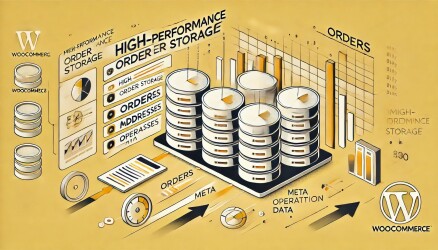The functions wc_get_products and WC_Product_Query provide the standard and correct way to retrieve products when working with WooCommerce. This is the right way because it won’t break due to future changes in the database following new versions of WooCommerce.
Using WP_Queries or direct database queries may break in the future as specific data and tables like these may undergo changes in new versions for better performance.
So, as WordPress theme and plugin developers, the correct way to retrieve a number of products is by using wc_get_products and WC_Product_Query, which are functionally equivalent to get_posts and WP_Query functions in WordPress core. In this case as well, you can use an array of arguments to define the query criteria or search.
The functions wc_get_products and WC_Product_Query
Here are some examples of using these functions, and in general, for this post, it seems that taking a look at the code comments will explain better what the code does…
// Get downloadable products created in the year 2016.
$products = wc_get_products( array(
'downloadable' => true,
'date_created' => '2016-01-01...2016-12-31',
) );
// Get 10 most recent product IDs in date descending order.
$query = new WC_Product_Query( array(
'limit' => 10,
'orderby' => 'date',
'order' => 'DESC',
'return' => 'ids',
) );
$products = $query->get_products();
// Get products containing a specific SKU.
// Does partial matching, so this will get products with SKUs "PRDCT-1", "PRDCT-2", etc.
$query = new WC_Product_Query();
$query->set( 'sku', 'PRDCT' );
$products = $query->get_products();
WC_Product_Query – Methods
These are the methods you can use with the WC_Product_Query function. I will leave the explanation in English in this case:
- get_query_vars() – Get an array of all the current query variables set on the query object.
- get( string $query_var, mixed $default = ” ) – Get the value of a query variable or the default if the query variable is not set.
- set( string $query_var, mixed $value ) – Set a query variable to a value.
- get_products() – Get all products matching the current query variables.
Parameters
General
status – Accepts a string or an array of strings: one or more of the following options: ‘draft’, ‘pending’, ‘private’, ‘publish,’ or custom status.
// Get draft products.
$args = array(
'status' => 'draft',
);
$products = wc_get_products( $args );
type – Accepts a string or an array of strings: one or more of the following options: ‘external’, ‘grouped’, ‘simple’, ‘variable,’ or custom type.
// Get external products.
$args = array(
'type' => 'external',
);
$products = wc_get_products( $args );
include – Accepts an array of integers: include only product IDs that are in this array.
// Get external products limited to ones with specific IDs.
$args = array(
'type' => 'external',
'include' => array( 134, 200, 210, 340 ),
);
$products = wc_get_products( $args );
exclude – Accepts an array of integers: exclude product IDs that are in this array.
// Get products that aren't the current product.
$args = array(
'exclude' => array( $product->get_id() ),
);
$products = wc_get_products( $args );
parent – Accepts an integer: the ID of the parent product.
// Get products with a specific parent.
$args = array(
'parent' => 20,
);
$products = wc_get_products( $args );
parent_exclude – Accepts an array of integers: exclude products with parent IDs that are in this array.
// Get products that don't have parent IDs of 20 or 21.
$args = array(
'parent_exclude' => array( 20, 21 ),
);
$products = wc_get_products( $args );
limit – Accepts an integer: maximum number of results to retrieve or -1 for unlimited.
// Get the latest 3 products.
$args = array(
'limit' => 3,
);
$products = wc_get_products( $args );
page – Accepts an integer: the page of results that the function should work on. Irrelevant if the offset parameter is in use.
// First 3 products.
$args = array(
'limit' => 3,
'page' => 1,
);
$page_1_products = wc_get_products( $args );
// Second 3 products.
$args = array(
'limit' => 3,
'page' => 2,
);
$page_2_products = wc_get_products( $args );
paginate – Responsible for pagination – accepts a boolean variable, True or False. Default is False.
// Get products with extra info about the results.
$args = array(
'paginate' => true,
);
$results = wc_get_products( $args );
echo $results->total . ' products found\n';
echo 'Page 1 of ' . $results->max_num_pages . '\n';
echo 'First product id is: ' . $results->products[0]->get_id() . '\n';
offset – Accepts an integer: the offset for the product results.
// Get the second to fifth most recent products.
$args = array(
'limit' => 4,
'offset' => 1
);
$products = wc_get_products( $args );
order – Accepts a string: the parameters ‘DESC’ or ‘ASC’. Use it in conjunction with ‘orderby’. Default is ‘DESC’.
// Get most recently modified products.
$args = array(
'orderby' => 'modified',
'order' => 'DESC',
);
$products = wc_get_products( $args );
orderby – Accepts a string: the parameters are ‘none’, ‘ID’, ‘name’, ‘type’, ‘rand’, ‘date’, ‘modified’. Default is ‘date’.
// Get some random products.
$args = array(
'orderby' => 'rand',
);
$products = wc_get_products( $args );
return – Accepts a string: the parameters are ‘ids’ or ‘objects’. Default is ‘objects’.
// Get product ids.
$args = array(
'return' => 'ids',
);
$products = wc_get_products( $args );
Product
sku – Accepts a string: checks if the string exists in the product’s SKU.
// Get products with "PRDCT" in their SKU (e.g., PRDCT-1 and PRDCT-2).
$args = array(
'sku' => 'PRDCT',
);
$products = wc_get_products( $args );
tag – Accepts an array: limits the results to products with specific tags based on their slug.
// Get products with the "Excellent" or "Modern" tags.
$args = array(
'tag' => array( 'excellent', 'modern' ),
);
$products = wc_get_products( $args );
category – Accepts an array: limits the results to products with specific categories based on their slug.
// Get shirts.
$args = array(
'category' => array( 'shirts' ),
);
$products = wc_get_products( $args );
weight, length, width, height – Accepts float values: the dimensions the products should have.
// Get products 5.5 units wide and 10 units long.
$args = array(
'width' => 5.5,
'length' => 10,
);
$products = wc_get_products( $args );
price, regular_price, sale_price – Accepts float values: the price at which the results should be.
// Get products that currently cost 9.99.
$args = array(
'price' => 9.99,
);
$products = wc_get_products( $args );
total_sales – Accepts an integer: retrieves products with a specific number of sales.
// Get products that have never been purchased.
$args = array(
'total_sales' => 0,
);
$products = wc_get_products( $args );
virtual, downloadable, featured, sold_individually, manage_stock, reviews_allowed – Accepts a Boolean variable: limits results to products with specific settings or features.
// Get downloadable products that don't allow reviews.
$args = array(
'downloadable' => true,
'reviews_allowed' => false,
);
$products = wc_get_products( $args );
backorders – Accepts a string: options are ‘yes’, ‘no’, or ‘notify’.
// Get products that allow backorders.
$args = array(
'backorders' => 'yes',
);
$products = wc_get_products( $args );
visibility – Accepts a string: options are ‘visible’, ‘catalog’, ‘search’, or ‘hidden’.
// Get products that show in the catalog.
$args = array(
'visibility' => 'catalog',
);
$products = wc_get_products( $args );
stock_quantity – Accepts an integer: the quantity of the product in stock.
// Get products that only have one left in stock.
$args = array(
'stock_quantity' => 1,
);
$products = wc_get_products( $args );
stock_status – Accepts a string: the status of the products in stock – ‘outofstock’ or ‘instock’.
// Get out of stock products.
$args = array(
'stock_status' => 'outofstock',
);
$products = wc_get_products( $args );
tax_status – Accepts a string: options are ‘taxable’, ‘shipping’, or ‘none’.
// Get taxable products.
$args = array(
'stock_status' => 'taxable',
);
$products = wc_get_products( $args );
tax_class – Accepts a string.
// Get products in the "Reduced Rate" tax class.
$args = array(
'tax_class' => 'reduced-rate',
);
$products = wc_get_products( $args );
shipping_class – Accepts a string or an array of strings.
// Get products in the "Bulky" shipping class.
$args = array(
'shipping_class' => 'bulky',
);
$products = wc_get_products( $args );
download_limit, download_expiry – Accepts an integer: the restriction on the number of downloads when 1 means unlimited.
// Get products with unlimited downloads.
$args = array(
'download_limit' => -1,
);
$products = wc_get_products( $args );
average_rating – Accepts a float: the average rating of the product.
// Get products with all 5-star ratings.
$args = array(
'average_rating' => 5.0,
);
$products = wc_get_products( $args );
review_count – Accepts an integer: the number of reviews for the product.
// Get products with 1 review.
$args = array(
'review_count' => 1,
);
$products = wc_get_products( $args );
Date
date_created, date_modified, date_on_sale_from, date_on_sale_to – Accepts a string: retrieves products based on the date with the format YYYY-MM-DD or TIMESTAMP.
// Get downloadable products created in the year 2016.
$products = wc_get_products( array(
'downloadable' => true,
'date_created' => '2016-01-01...2016-12-31',
) );
Adding Your Own Parameters
You can add support for your own parameters by using the hook named woocommerce_product_data_store_cpt_get_products_query and filtering the query as follows:
/**
* Handle a custom 'customvar' query var to get products with the 'customvar' meta.
* @param array $query - Args for WP_Query.
* @param array $query_vars - Query vars from WC_Product_Query.
* @return array modified $query
*/
function handle_custom_query_var( $query, $query_vars ) {
if ( ! empty( $query_vars['customvar'] ) ) {
$query['meta_query'][] = array(
'key' => 'customvar',
'value' => esc_attr( $query_vars['customvar'] ),
);
}
return $query;
}
add_filter( 'woocommerce_product_data_store_cpt_get_products_query', 'handle_custom_query_var', 10, 2 );
And you can use it like this:
$products = wc_get_products( array( 'customvar' => 'somevalue' ) );


